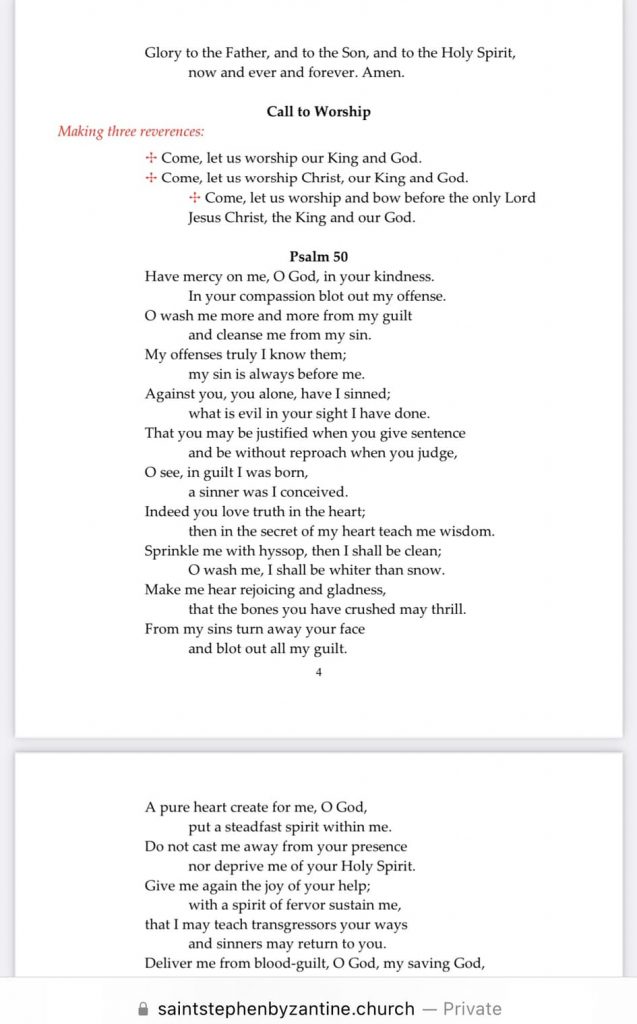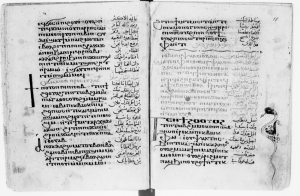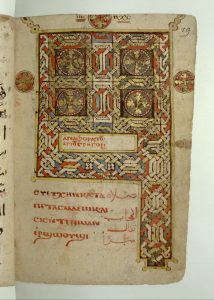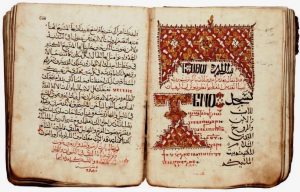In all honesty, the last post about ⲙⲁⲣⲉⲛⲟⲩⲱⲛϩ ⲉⲃⲟⲗ got my writing motor running again, so I had to crank this one out too—another piece detailing some beautiful liturgical practices we have and simultaneously shedding some light on how our current apps (Coptic Reader) and liturgical failures are hindering us from seeing the intricacies and deeper connections.
The earliest attestations to Coptic liturgical prayer in the Bohairic tradition inform us that the beginning of prayers is as follows:
1) ⲕⲩⲣⲓⲉ ⲉⲗⲉⲏⲥⲟⲛ ⳾ ⲕⲩⲣⲓⲉ ⲉⲗⲉⲏⲥⲟⲛ ⳾ ⲕⲩⲣⲓⲉ ⲉⲩⲗⲟⲅⲏⲥⲟⲛ ⳾ ⲁⲙⲏⲛ ⳾ ⲁⲗⲗⲏⲗⲟⲩⲓⲁ (Lord, have mercy. Lord, have mercy, Lord, bless. Amen. Alleluia!)
2) ⲇⲟⲝⲁ ⲡⲁⲧⲣⲓ ⳾ ⲕⲉ ⲛⲩⲛ (Glory to the Father…Now and ever…)
3) ⲁⲣⲓⲧⲉⲛ ⲛ̀ⲉⲙⲡϣⲁ ⳾ ϫⲉ ⲡⲉⲛⲓⲱⲧ (Make us worthy • Our Father)
4) ⲙⲁⲣⲉⲛϣⲉⲡϩⲙⲟⲧ (Let us give thanks)
In modern practice (aside from the replacement of #1 with “In the name…”), the automatic go to after “Let us give thanks” is Psalm 50 “Have mercy on me, O God.” However, it was not directly so in our older liturgical resources and manuscripts. Not that Psalm 50 was not chanted in every service, but the order here is quite important. What follows the prayer of thanksgiving is what Fr. Robert Taft and O.H.E Burmester call the “Invitatory” Prayers. And these prayers do just that—invite us all to join in prayer together. We Copts actually have 3 different Invitatory Prayers, but we do not understand them as such and for this reason, we miss out on some beautiful details. Let’s take a look:
Invitatory Prayer for Matins
| Ⲁⲙⲱⲓⲛⲓ ⲙⲁⲣⲉⲛⲟⲩⲱϣⲧ ⳾ ⲁⲙⲱⲓⲛⲓ ⲙⲁⲣⲉⲛϯϩⲟ ⲉⲡ︦ⲭ︦ⲥ︦ ⲡⲉⲛⲛⲟⲩϯ ⳾ Ⲁⲙⲱⲓⲛⲓ ⲙⲁⲣⲉⲛⲟⲩⲱϣⲧ ⳾ ⲁⲙⲱⲓⲛⲓ ⲙⲁⲣⲉⲛϯϩⲟ ⲉⲡ︦ⲭ︦ⲥ︦ ⲡⲉⲛⲟⲩⲣⲟ ⳾ Ⲁⲙⲱⲓⲛⲓ ⲙⲁⲣⲉⲛⲟⲩⲱϣⲧ ⳾ ⲁⲙⲱⲓⲛⲓ ⲙⲁⲣⲉⲛϯϩⲟ ⲉⲡ︦ⲭ︦ⲥ︦ ⲡⲉⲛⲥⲱⲧⲏⲣ ⳾ Ⲡⲉⲛ⳪ ⲓ︦ⲏ︦ⲥ︦ ⲡ︦ⲭ︦ⲥ︦ ⲡⲓⲗⲟⲅⲟⲥ ⲛ̀ⲧⲉ ⲫϯ ⲡⲉⲛⲛⲟⲩϯ ⳾ ϩⲓⲧⲉⲛ ⲛⲓⲡⲣⲉⲥⲃⲓⲁ ⲛ̀ⲧⲉ ϯⲁⲅⲓⲁ ⲙⲁⲣⲓⲁ ⳾ ⲛⲉⲙ ⲛⲏⲉⲑⲟⲩⲁⲃ ⲛ̀ⲧⲁⲕ ⳾ Ⲁⲣⲉϩ ⲉⲣⲟⲛ ⲟⲩⲟϩ ⲙⲁⲣⲉⲛϯⲟⲩⲱ ⲛ̀ⲟⲩⲱ ⲉⲛⲁⲛⲉϥ ⳾ ⲟⲩⲟϩ ⲛⲁⲓ ⲛⲁⲛ ⲕⲁⲧⲁ ⲡⲉⲕⲟⲩⲱϣ ϣⲁ ⲉⲛⲉϩ ⳾ Ⲡⲓⲉϫⲱⲣϩ ⲁϥⲥⲓⲛⲓ ⲧⲉⲛϣⲉⲡϩⲙⲟⲧ ⲛ̀ⲧⲟⲧⲕ ⲡ⳪ ⳾ ⲟⲩⲟϩ ⲧⲉⲛϯϩⲟ ⲉⲣⲟⲕ ⲉⲑⲣⲉⲕⲁⲣⲉϩ ⲉⲣⲟⲛ ϧⲉⲛ ⲡⲁⲓⲉϩⲟⲟⲩ ⲫⲁⲓ ⲉⲛⲟⲓ ⲛ̀ⲁⲑⲛⲟⲃⲓ ⲟⲩⲟϩ ⲙⲁⲧⲟⲩϫⲟⲛ ⳾ Ϯϯϩⲟ ⲉⲣⲱⲧⲉⲛ ⲁⲛⲟⲕ ϧⲁ ⲫⲏⲉⲧⲥⲱⲛϩ ϧⲉⲛ ⲡ⳪ ⳾ ⲉⲙⲟϣⲓ ⲕⲁⲧⲁ ⲡⲉⲙⲡⲙϣⲁ ⲛ̀ⲧⲉ ⲡⲓⲑⲱϩⲉⲙ ⲫⲏⲉⲧⲁⲩⲑⲁϩⲉⲙ ⲑⲏⲛⲟⲩ ⲉⲣⲟϥ ϧⲉⲛ ⲑⲉⲃⲓⲟ ⲛ̀ϩⲏⲧ ⲛⲓⲃⲉⲛ ⳾ ⲛⲉⲙ ⲟⲩⲙⲉⲧⲣⲉⲙⲣⲁⲩϣ ⳾ ⲛⲉⲙ ⲟⲩⲙⲉⲧⲣⲉϥⲱⲟⲩⲛϩⲏⲧ ⳾ Ⲉⲣⲉⲧⲉⲛⲉⲣⲁⲛⲉⲭⲉⲥⲑⲉ ⲛ̀ⲛⲉⲧⲉⲛⲉⲣⲏⲟⲩ ϧⲉⲛ ⲟⲩⲁⲅⲁⲡⲏ ⳾ Ⲉⲣⲉⲧⲉⲛⲓⲏⲥ ⲉⲁⲣⲉϩ ⲉϯⲙⲉⲧⲟⲩⲁⲓ ⲛ̀ⲧⲉ ⲡⲓⲡ︦ⲛ︦ⲁ︦ ϧⲉⲛ ⲡⲓⲙⲟⲩⲣ ⲉⲧϫⲏⲕ ⲉⲃⲟⲗ ⲛ̀ⲧⲉ ϯϩⲓⲣⲏⲛⲏ ⳾ Ⲟⲩⲥⲱⲙⲁ ⲛ̀ⲟⲩⲱⲧ ⲛⲉⲙ ⲟⲩⲡ︦ⲛ︦ⲁ︦ ⲛ̀ⲟⲩⲱⲧ ⳾ ⲕⲁⲧⲁ ⲫⲣⲏϯ ⲉⲧⲁⲩⲑⲁϩⲉⲙ ⲑⲏⲛⲟⲩ ϧⲉⲛ ⲟⲩϩⲉⲗⲡⲓⲥ ⲛ̀ⲟⲩⲱⲧ ⳾ Ⲟⲩ⳪ ⲛ̀ⲟⲩⲱⲧ ⳾ ⲟⲩⲛⲁϩϯ ⲛ̀ⲟⲩⲱⲧ ⳾ ⲟⲩⲱⲙⲥ ⲛ̀ⲟⲩⲱⲧ ⳾ [ⲉⲣⲉⲧⲉⲛⲁⲣⲉϩ ⲉⲣⲱⲟⲩ] ⳾ Ⲟⲩⲁⲓ ⲡⲉ ⲫϯ ⲫⲓⲱⲧ ⲛ̀ⲧⲉ ⲟⲩⲟⲛ ⲛⲓⲃⲉⲛ ⳾ Ⲟⲩⲁⲓ ⲟⲛ ⲡⲉ ⲡⲉϥϣⲏⲣⲓ ⲓ︦ⲏ︦ⲥ︦ ⲡ︦ⲭ︦ⲥ︦ ⳾ Ⲡⲓⲗⲟⲅⲟⲥ ⲉⲧⲁϥϭⲓⲥⲁⲣⲝ ⳾ ⲁϥⲙⲟⲩ ⲟⲩⲟϩ ⲁϥⲧⲱⲛϥ ϧⲉⲛ ⲡⲓⲉϩⲟⲟⲩ ⲙ̀ⲙⲁϩϣⲟⲙⲧ ⳾ ⲁϥⲧⲟⲩⲛⲟⲥⲧⲉⲛ ⲛⲉⲙⲁϥ ⳾ Ⲡⲓⲡ︦ⲛ︦ⲁ︦ ⲉⲑⲟⲩⲁⲃ ⲙ̀ⲡⲁⲣⲁⲕⲗⲏⲧⲟⲛ ⳾ ⲟⲩⲁⲓ ⲣⲱ ⲟⲛ ⲡⲉ ϧⲉⲛ ⲧⲉϥϩⲩⲡⲟⲥⲧⲁⲥⲓⲥ ⳾ ⲉϥⲛⲏⲟⲩ ⲉⲃⲟⲗ ϧⲉⲛ ⲫⲓⲱⲧ ⳾ Ⲉϥⲧⲟⲩⲃⲟ ⲛ̀ϯⲕⲧⲏⲥⲓⲥ ⲧⲏⲣⲥ ⳾ ⲉϥⲧⲥⲁⲃⲟⲛ ⲙ̀ⲙⲟⲛ ⲉⲟⲩⲱϣⲧ ⲛ̀ϯⲧⲣⲓⲁⲥ ⲉⲑⲟⲩⲁⲃ ϧⲉⲛ ⲟⲩⲙⲉⲑⲛⲟⲩϯ ⲛ̀ⲟⲩⲱⲧ ⳾ ⲛⲉⲙ ⲟⲩⲫⲩⲥⲓⲥ ⲛ̀ⲟⲩⲱⲧ ⳾ ⲧⲉⲛϩⲱⲥ ⲧⲉⲛⲥⲙⲟⲩ ⲉⲣⲟϥ ϣⲁ ⲛⲓⲉⲛⲉϩ ⲁⲙⲏⲛ | Come, let us worship! Come, let us ask Christ our God! Come, let us bow down! Come, let us beseech Christ our King! Come, let us kneel! Come, let us plead with Christ our Savior! O our LORD Jesus Christ, the Word of God, our God, through the prayers of Saint Mary, and all your holy ones, keep us, let us bring forth good yield, and have mercy on us according to Your will, forever. The night has passed; we thank You, Lord, and we entreat You that You may preserve us this very day, we being sinless, and save us! I ask you —I, the prisoner in/of the Lord—to walk according to the worthiness of the calling to which you were called, in all humility of heart, and meekness, and patience, bearing with one another in love, hastening to preserve the unity of the Spirit in the perfect bond of peace one body, and one spirit, according to the manner in which you were called in one hope. One Lord, one faith, one baptism, [preserve them]. One is God, Father of everyone, One, also, is His Son, Jesus Christ, the Word who took flesh, died, rose on the third day, and raised us with Himself. The Holy Spirit, the Paraclete—again, one, also, is He in His hypostasis, proceeding from the Father. He purifies all creation and teaches us to worship the Holy Trinity in one divinity and one nature (φυσις). We praise and bless Him, forever! Amen. |
Invitatory Prayer for Vespers
| Ⲁⲙⲱⲓⲛⲓ ⲙⲁⲣⲉⲛⲟⲩⲱϣⲧ ⲙ̀ⲡ⳪ (ⲅ︦ ⲛ̀ⲥⲟⲡ) ⲛ̀ⲧⲉⲛϩⲓⲧⲧⲉⲛ ⲉϧⲣⲏⲓ ⲙ̀ⲡⲉϥⲙⲑⲟ ⳾ ⲙ̀ⲡⲓⲉϩⲟⲟⲩ ⲛⲉⲙ ⲡⲓⲉϫⲱⲣϩ ⳾ ⲡⲁⲟⲩⲣⲟ ⲟⲩⲟϩ ⲡⲁⲛⲟⲩϯ ⳾ ϯⲛⲁⲉⲣϩⲉⲗⲡⲓⲥ ⲉⲣⲟϥ ⳾ ⲛ̀ⲧⲉϥⲭⲁ ⲛⲉⲛⲛⲟⲃⲓ ⲛⲁⲛ ⲉⲃⲟⲗ ⳾ | Come, let us worship the LORD (3 times) and, day and night, cast ourselves before Him; my king and my God—in Him, I will hope that He may forgive us our sins. |
Invitatory Prayer for Midnight
| Ⲧⲱⲟⲩⲛⲟⲩ ⲉⲡϣⲱⲓ ⲛⲓϣⲏⲣⲓ ⲛ̀ⲧⲉ ⲡⲓⲟⲩⲱⲓⲛⲓ ⲛ̀ⲧⲉⲛϩⲱⲥ ⲉⲡ⳪ ⲛ̀ⲧⲉ ⲛⲓϫⲟⲙ ⳾ | Arise, O you children (sons) of the Light, that we may praise the LORD of hosts • |
| Ϩⲟⲡⲱⲥ ⲛ̀ⲧⲉϥⲁⲣⲓϩⲙⲟⲧ ⲛⲁⲛ ⲙ̀ⲡⲥⲱϯ ⲛ̀ⲧⲉ ⲛⲉⲛⲯⲩⲭⲏ ⳾ | in order that He may grant us the salvation of our souls. • |
| Ϧⲉⲛ ⲡϫⲓⲛⲑⲣⲉⲛⲟϩⲓ ⲉⲣⲁⲧⲉⲛ ⲙ̀ⲡⲉⲕⲙⲑⲟ ⲥⲱⲙⲁⲧⲓⲕⲱⲥ ⳾ | When we stand in Your presence, bodily, • |
| Ⲁⲗⲓⲟⲩⲓ ⲉⲃⲟⲗϩⲓⲧⲉⲛ ⲡⲉⲛⲛⲟⲩⲥ ⲙ̀ⲡⲓϩⲓⲛⲓⲙ ⲛ̀ⲧⲉ ϯⲉⲃϣⲓ ⳾ | cast away from our mind the slumber of negligence. • |
| Ⲙⲟⲓ ⲛⲁⲛ ⲡ⳪ ⲛ̀ⲟⲩⲙⲉⲧⲣⲉϥⲉⲣⲛⲩⲫⲓⲛ ϩⲟⲡⲱⲥ ⲛ̀ⲧⲉⲛⲕⲁϯ ⲛ̀ⲧⲉⲛⲟϩⲓ ⲉⲣⲁⲧⲉⲛ ⲙ̀ⲡⲉⲕⲙⲑⲟ ⲙ̀ⲫⲛⲁⲩ ⲛ̀ⲧⲉ ϯⲡⲣⲟⲥⲉⲩⲭⲏ ⳾ | Grant us sobriety, O LORD, that we may comprehend our standing in Your presence at the time of prayer, • |
| Ⲟⲩⲟϩ [ⲛ̀]ⲧⲉⲛⲟⲩⲱⲣⲡ ⲛⲁⲕ ⲉⲡϣⲱⲓ ⲛ̀ϯⲇⲟⲝⲟⲗⲟⲅⲓⲁ ⲉⲧⲉⲣⲡⲣⲉⲡⲓ ⲟⲩⲟϩ ⲛ̀ⲧⲉⲛϣⲁϣⲛⲓ ⲉⲡⲭⲱ ⲉⲃⲟⲗ ⲛ̀ⲧⲉ ⲛⲉⲛⲛⲟⲃⲓ ⲉⲧⲟϣ ⳾ ⲇⲟⲝⲁ ⲥⲓ ⲱ ⲫⲓⲗⲁⲛⲑⲣⲱⲡⲉ ⳾ ϣⲁ ⲡⲉⲥϫⲱⲕ | and send up to You the proper doxology, and attain the forgiveness of our many sins. • Glory be to You, O Lover of Man[kind]” • … |
Notes:
A) Invitatory of Matins
– In translating the first section of this prayer, there is some flexibility since the Coptic keeps the same words ⲟⲩⲱϣⲧ and ϯϩⲟ which can be rendered in a variety of ways. Arabic translations in the past have exercised this flexibility, specifically ϯϩⲟ, and rendered three different words for petition.
– In the next segment, ⲙⲁⲣⲉⲛϯⲟⲩⲱ ⲛ̀ⲟⲩⲱ ⲉⲛⲁⲛⲉϥ has been translated previously because of the current Arabic as “bring us to a good start”, however, the word ⲟⲩⲱ retains the context of yielding forth or blossoming. This is evidenced by the translations of the early psalmody manuscripts. (As an aside, the word ⲟⲩⲱ has other meanings which would be interesting to look at in this passage)
– While the third segment of this prayer extrapolates from chapter 4 of St Paul’s Epistle to the Ephesians, it is not a direct reading. This is why, liturgically, there’s no introduction to the prayer (unlike the Liturgy of the Word). The segment in brackets [ⲉⲣⲉⲧⲉⲛⲁⲣⲉϩ ⲉⲣⲱⲟⲩ/preserve them] is an addition that is not present in the Scriptures. Likewise, the remainder of the text beginning with ⲟⲩⲁⲓ ⲟⲛ ⲡⲉ/One, also, is…, is also not present in the Scripture. Nowadays, they split this prayer into pieces and say that the first segment is from St. Paul, and the latter segment is “from the faith of the Church”, but the earlier psalmodies and ajpeya manuscripts make no such distinction.
B ) Invitatory of Vespers
– This prayer has unfortunately fallen out of all our current ajbeyas, however, it remains present in the older psalmodies, not just the manuscripts, but even the printed editions from Egypt.
– I remember as a youth, we were taught or rather had heard that there were no metanoia/prostrations to be done in the afternoon or the evening of the day. Having a liturgical text that calls us to worship, meaning to bow down and, if it wasn’t explicitly clear, to cast ourselves before Him day and night, makes this “teaching” moot.
– As with all of our prayers in the Coptic Rite, there is a movement between personal and public prayer…”let us worship…my king and my God” and ”I hope…our sins”.
C) Invitatory of Midnight
– There is much to be said about this hymn, but here we will just look at its text. The first word, which you’ve all seen as ⲧⲉⲛⲑⲏⲛⲟⲩ, is according to the oldest psalmody manuscripts supposed to be ⲧⲱⲟⲩⲛⲟⲩ. Both words are to the same effect, but ⲧⲱⲟⲩⲛⲟⲩ is the same root as ⲧⲱⲛⲕ ⲧⲱⲛϥ ⲧⲱⲛⲓ etc. and brings along with it that context of resurrection. Notice also the Scriptural reference to sons of Light as it has many implications in the liturgical use of the hymn.
– Modern English translations have “the befitting glorification” but I believe that translation misses the point entirely. The more literal translation is “proper doxology”. But why does that matter? Well, have you ever wondered what glorification? Ever thought about the refrain, “Glory be to You, O Lover of Man”? In Greek it begins with ⲇⲟⲝⲁ as does ⲇⲟⲝⲟⲗⲟⲅⲓⲁ ⲉⲧⲉⲣⲡⲣⲉⲡⲓ. No wonder then the first time this refrain is chanted is directly after this verse. We petition God for sobriety that we may comprehend our standing in His presence and send up to Him the proper doxology, that is, ⲇⲟⲝⲁ ⲥⲓ ⲱ ⲫⲓⲗⲁⲛⲑⲣⲱⲡⲉ.
– The majority of the remainder of this text (not included here) is direct quotations from the Psalms, specifically Psalms 134 and 118.
During my time at seminary, when I was praying these texts consistently, something struck me. Because we had a daily liturgical routine in which we, quite literally, returned to God (as Fr. Chad so eloquently put it) twice or three times a day, the contrast between the Church and the world became almost jarring. The times that we joined together for prayer were reorienting our minds, bodies, and spirits. And it was this thought of reorientation that lit up in my mind like a lightbulb when I connected these three invitatory prayers. These three Coptic prayers physically and spiritually break the normative orientation of that time of the day or night—during the day, morning or evening, the call to prayer asks you to bow down to the ground (though you are beginning your day upright, or have been upright all the day) whereas the midnight prayer calls you to rise (though you may be sleeping and lying on the ground). In a sense, I would venture that these invitatory prayers allow for the return of the mind and spirit through a physical action, as do so many other Orthodox practices.
Here, I would also like to add more context on the Midnight Invitatory ⲧⲱⲟⲩⲛⲟⲩ and its use. Though rarely performed today, our tradition teaches us that on the eve of the Paschal Feast (Resurrection), as we enter the Church, the Gospel of John is wrapped in white linen, in front of it candles are lit, and all the people process into and around the church singing “Arise, O you sons of Light”. I believe that it is no small matter that this hymn is chanted for this procession considering the theme of the entire Paschal mystery, the rising from the dead into the Light of the Resurrection, being baptized into His death and putting on Christ, who in the Gospel of John is the True Light, the emanation of the glory of the Father whose sons we have become.
Moving forward, our rubrics indicate to us that only after these prayers are completed is Psalm 50 chanted followed by ⲡⲓϩⲩⲙⲛⲟⲥ, i.e. the psalms of the hour. Psalm 50 is the beginning of the psalms, not the conclusion of the introductory prayers per se. Hence, we see in the rites of the funeral, or consecrations, or baptisms, that Psalm 50 is chanted (often we see it read now, but this is just improper practice), followed directly or indirectly by the psalms relevant to the rite or occasion. You also see ⲧⲱⲟⲩⲛⲟⲩ chanted before the entirety of the Psalter is chanted/read during consecrations for churches. In the same sense, in the Midnight office, for example, the order as documented by Ibn Kabar and preserved in our psalmodies is:
Lord, have mercy…
Glory to the Father…
Make us worthy/Our Father
Let us give thanks
“Arise, O you sons of the Light”
Psalm 50, Psalms of the Midnight Office, Troparia of the Midnight Office, the Alleluia, and the Great Canticle of Psalms
The Four Canticles and their hymns etc.
More importantly, as I’ve mentioned multiple times in the past, our older/more authentic practices are preserved on our most solemn occasions (as Anton Baumstark notes in his liturgical law). So, let’s take a gander at Matins of Holy Saturday. Any digital book, and any printed book before that, and any manuscript before that will always have ⲁⲙⲱⲓⲛⲓ before Psalm 50 (and not just on Holy Saturday, but on Palm Sunday and on Resurrection Sunday—yes, Psalm 50 was chanted in the middle of matins on those occasions and actually during every vespers and matins throughout the year). However, last year, @CopticReader took it upon themselves to change the order to match what they thought was proper based on current forms of the ⲁϫⲡⲓⲁ.
You might think, okay so what? It’s not that big of deal. For me, it’s a grave concern, for a few reasons: 1) Had I not known the original order due to familiarity, the one link to the older practice preserved on Holy Saturday, would be gone. So going forward, any chance for our children to be familiar with the origins of the structure is removed. It is one thing to read about some older practice, and another to see it performed, especially on a holy day. 2) Our rites function like a system. At least within the rite that is practiced by the Church in the Bohairic tradition, there is an inherent system in place and most things follow an order that makes sense, relatively ![]() Shifting that system because it doesn’t make sense to YOU is unacceptable. It doesn’t belong to you. At the very least, if you don’t understand something, ASK. There’s no shame in asking for help, or clarification, or even just someone’s thoughts. 3) The ability to draw connections to our own rites, and the rites of other Orthodox churches, as well as the clarity in uncovering liturgical/theological similarities becomes ambiguous the further away we get from the older order. 4) Most significantly, I want to raise awareness that the Tradition of our Church is above all our heads—hierarchs, clergy, and laity. We can take ownership of it and embody it, but we cannot deal with it haphazardly, carelessly, and ignorantly, or as if we have authority and free reign over it. We are stewards responsible before God for the gift that is our tradition—that which our fathers struggled, even died, to hold on to. The Tradition of the Church is the handing down of the experience of God that our forefathers, through faith, have lived.
Shifting that system because it doesn’t make sense to YOU is unacceptable. It doesn’t belong to you. At the very least, if you don’t understand something, ASK. There’s no shame in asking for help, or clarification, or even just someone’s thoughts. 3) The ability to draw connections to our own rites, and the rites of other Orthodox churches, as well as the clarity in uncovering liturgical/theological similarities becomes ambiguous the further away we get from the older order. 4) Most significantly, I want to raise awareness that the Tradition of our Church is above all our heads—hierarchs, clergy, and laity. We can take ownership of it and embody it, but we cannot deal with it haphazardly, carelessly, and ignorantly, or as if we have authority and free reign over it. We are stewards responsible before God for the gift that is our tradition—that which our fathers struggled, even died, to hold on to. The Tradition of the Church is the handing down of the experience of God that our forefathers, through faith, have lived.
We ought to reevaluate how we’re doing things when it comes to our liturgical praxis (and with many other things, but that’s above my pay grade and not my forte haha). I believe the laity need to be more diligent in seeking the depths of their heritage, and the hierarchy needs to create a space for the research being conducted. We need to have principles and standards that we abide by when dealing with our rites and texts. The convenience of an application that allows for change any moment has preempted us to make haphazard unnecessary shifts. I am strongly urging that a discussion is had about this topic. And as always I’m happy to hear all your thoughts!
ⲟⲩϫⲁⲓ ϧⲉⲛ ⲡ⳪
Reference Images:
1–3) Bodl.Hunt.256 (1388 AD) – Matins Invitatory; Notice there are no breaks in the prayer itself, and after it is completed, there is an instruction to sing ⲛⲁⲓ ⲛⲏⲓ ⲫϯ (Psalm 50)
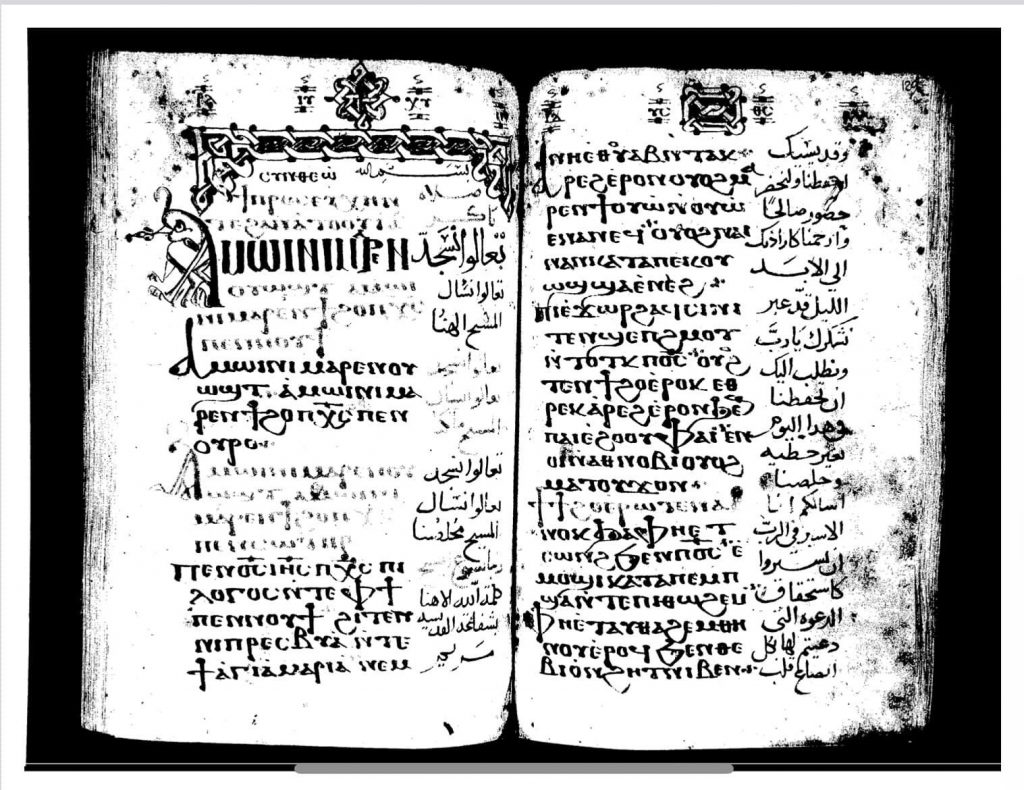
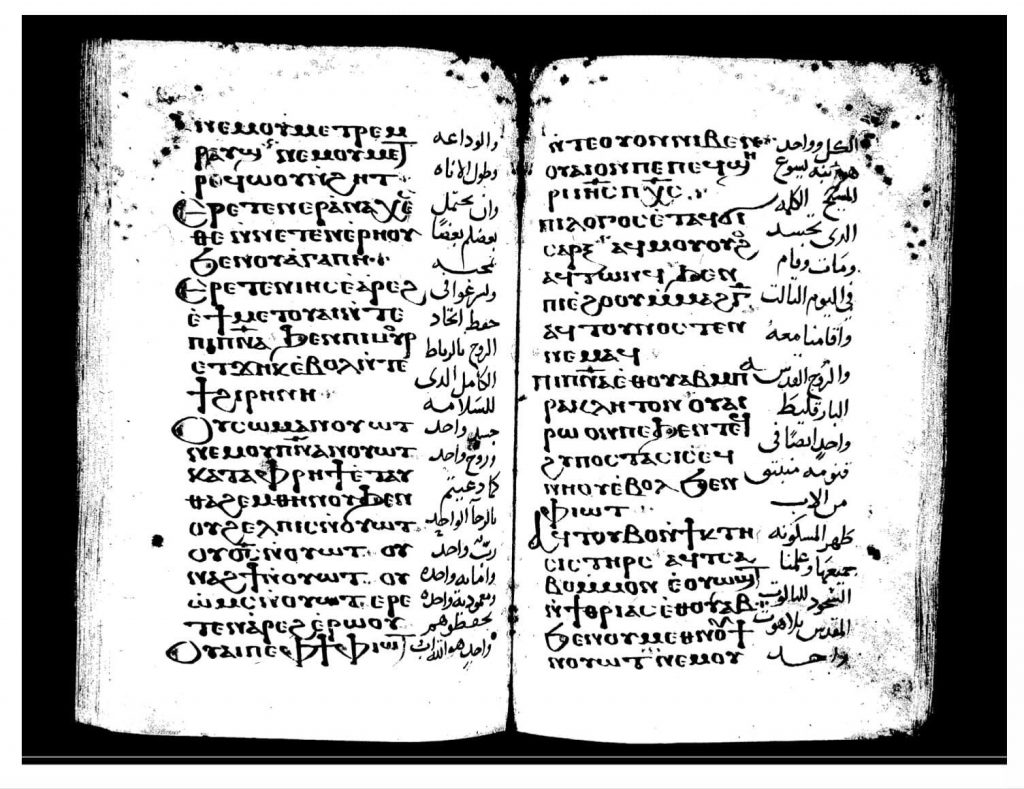
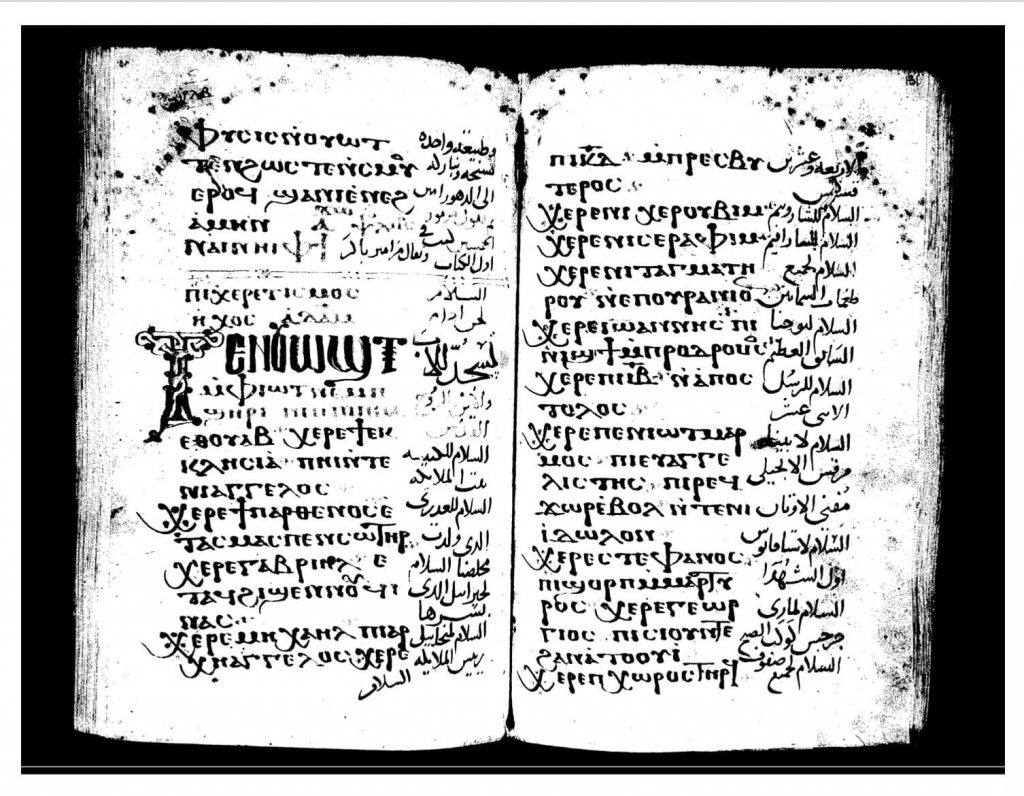
4) Bodl.Hunt.256 (1388 AD) – Vespers Invitatory
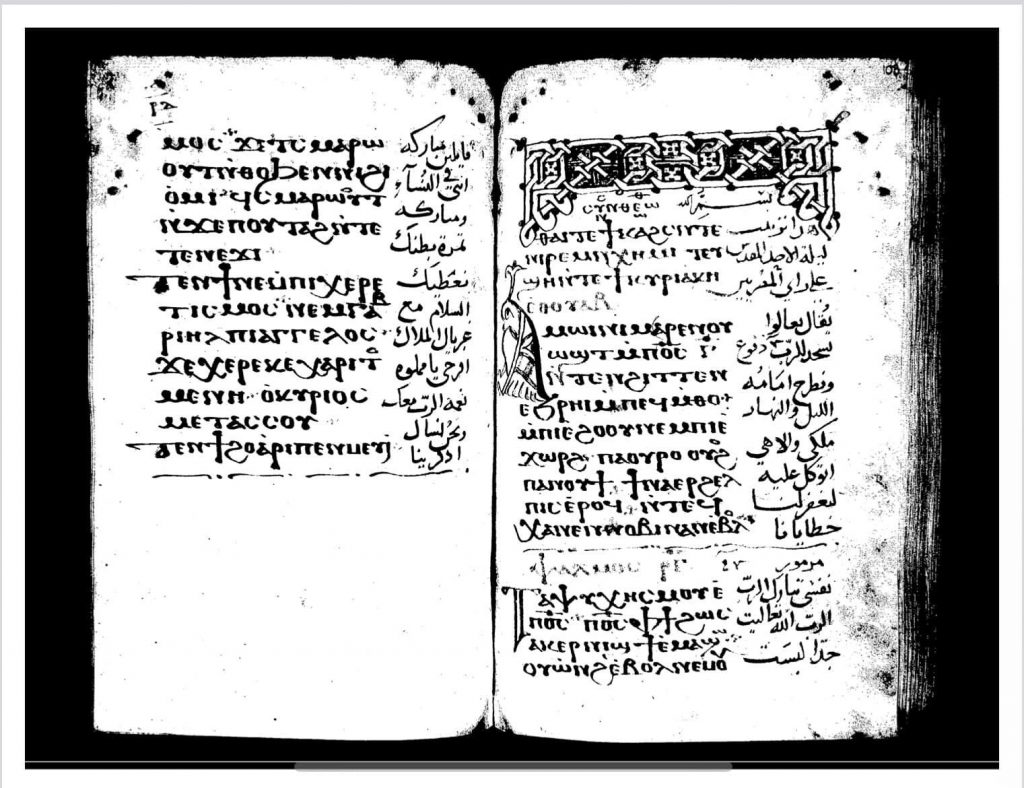
5–7) CVP.HMML.3 (14th c.) – Matins Invitatory; again, there are no segmentations in the prayer
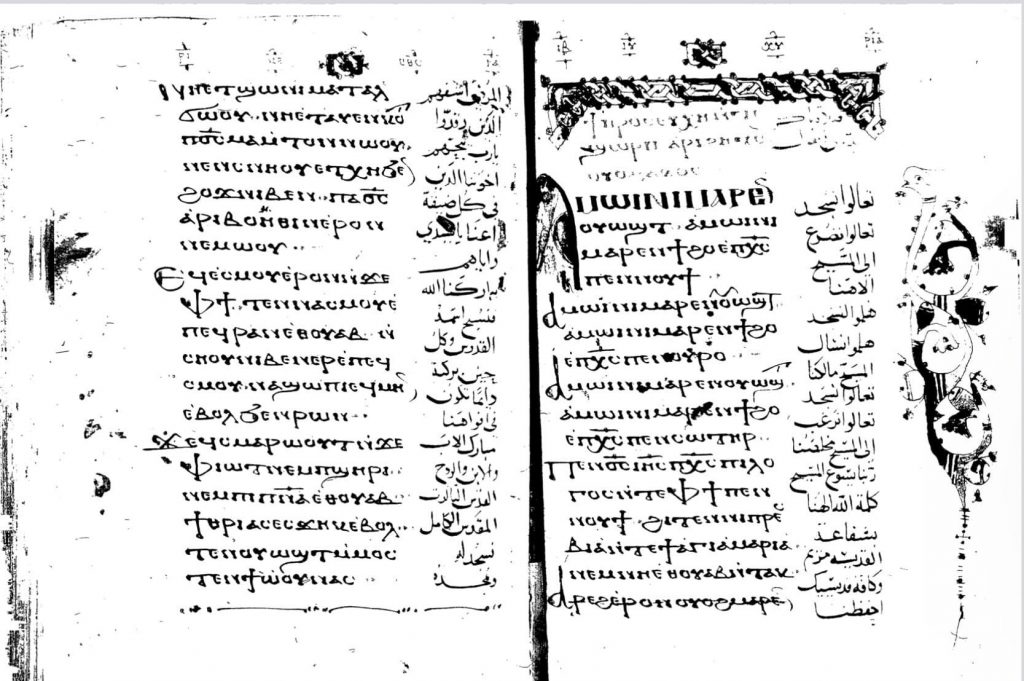
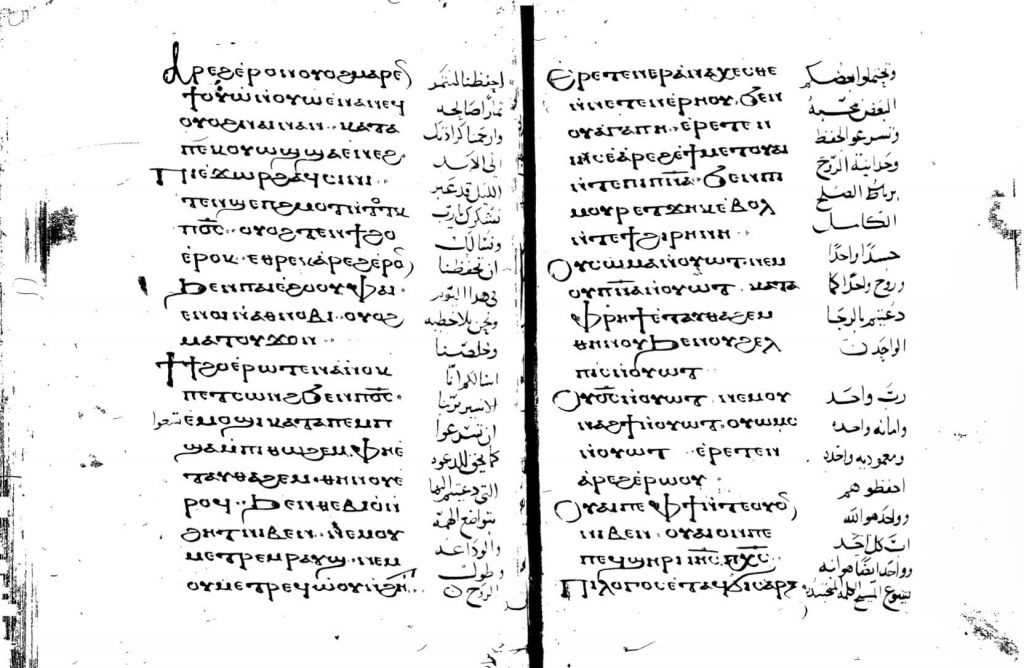
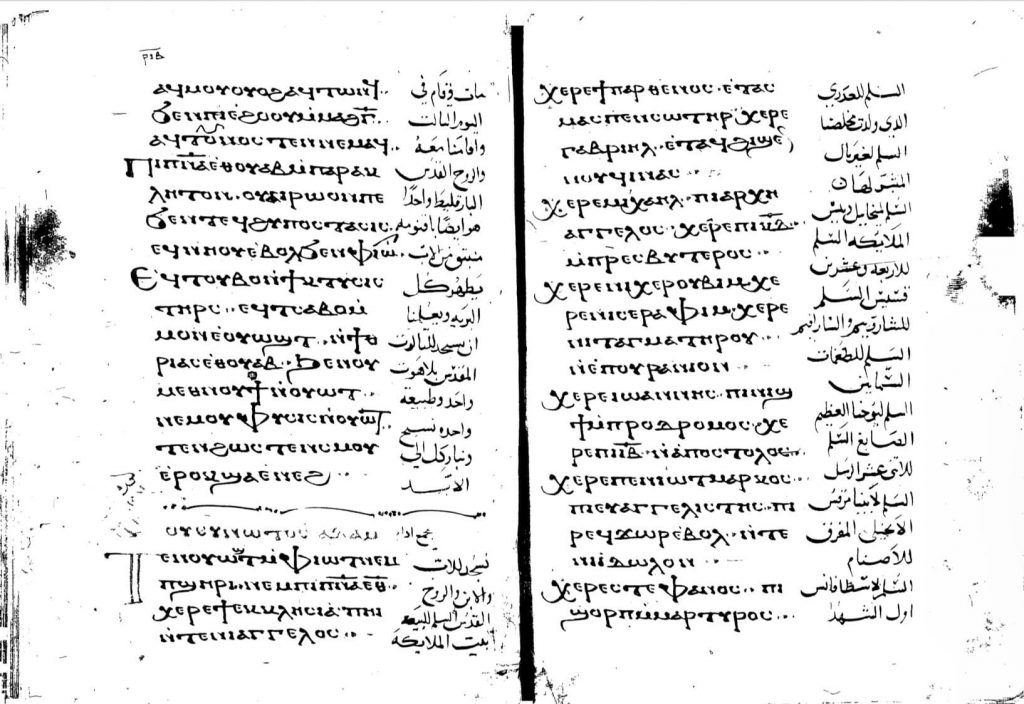
8 ) CVP.HMML.3 (14th c.) – Vespers Invitatory
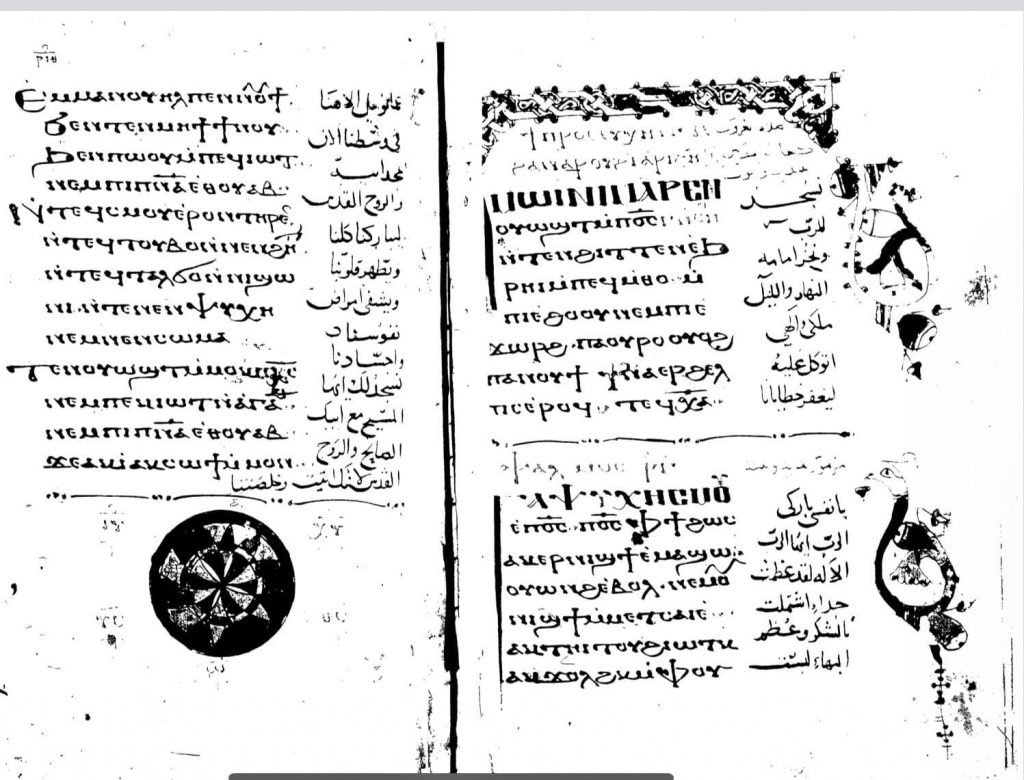
9–11) Uppsala MS for Ibn Kabar’s Misbah Midnight, Vespers, and Matins, respectively. Notice the order of the Midnight Office as I detailed above as well as the mention of ⲡⲓϩⲩⲙⲛⲟⲥ within the Matins service after Psalm 50
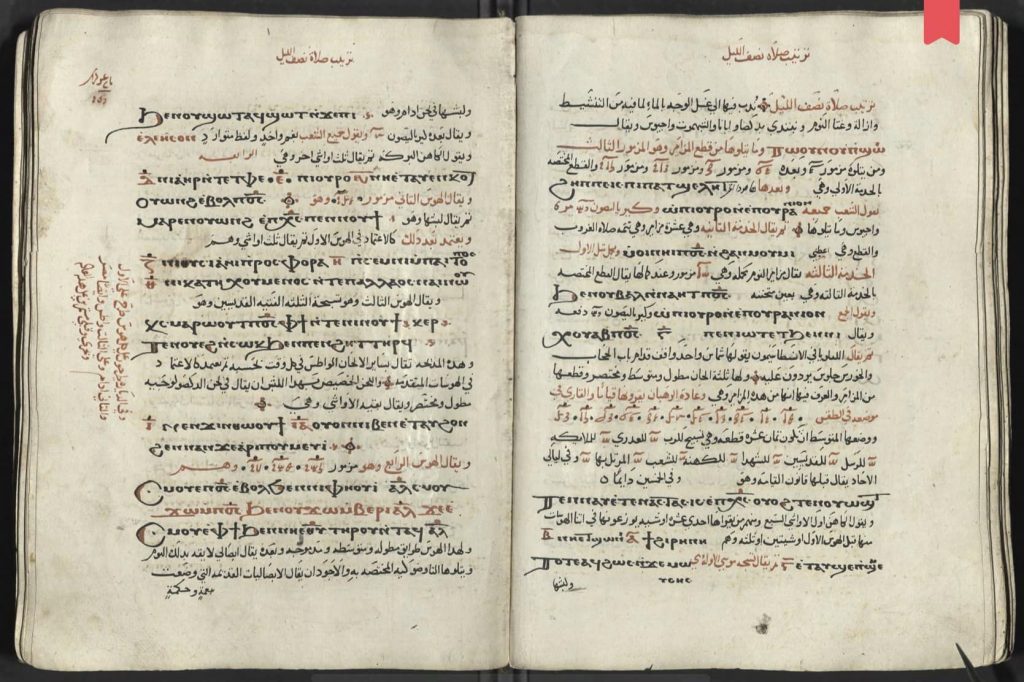
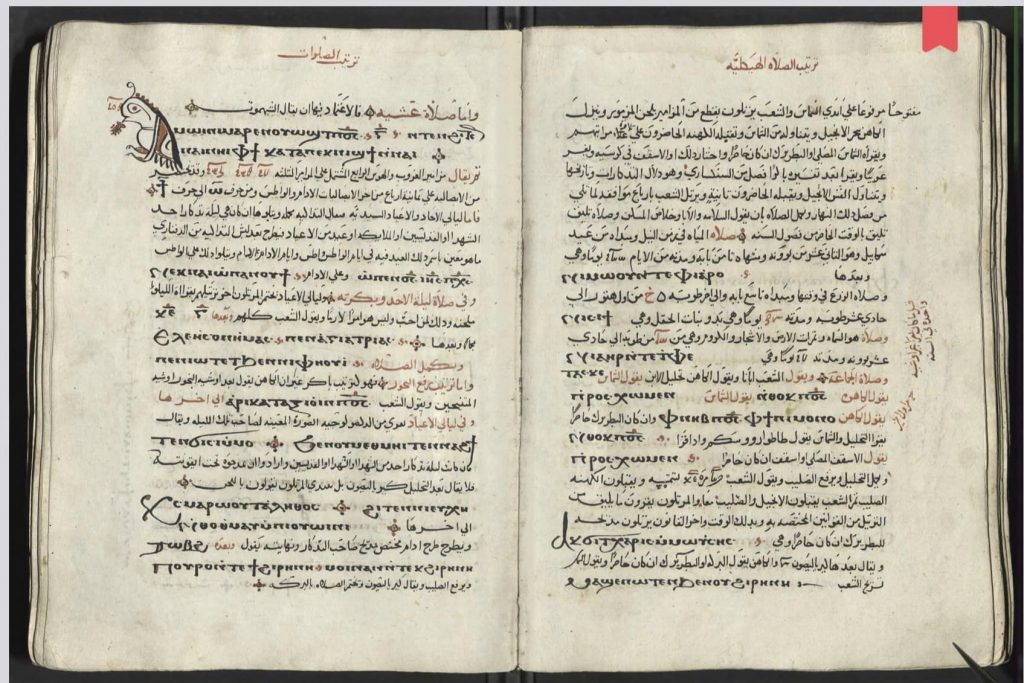
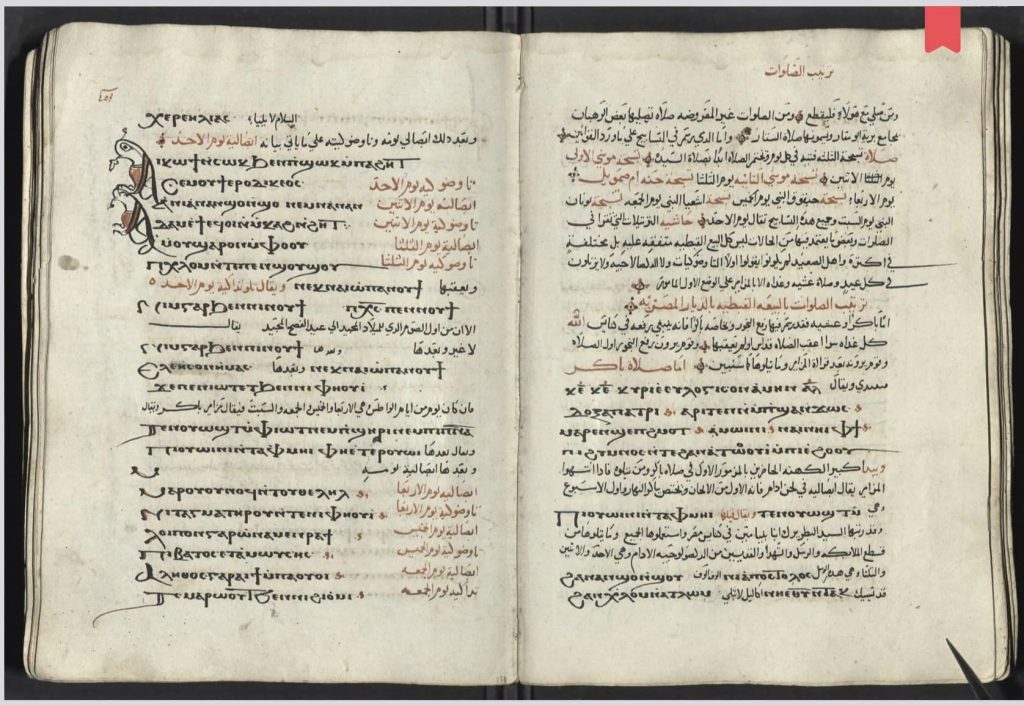
12) BNF.Arabe.203; Paris MS for Ibn Kabar’s Misbah; Again the Midnight Office order mentions ⲧⲱⲟⲩⲛⲟⲩ then the psalms, and the troparia for the hours of Midnight. You’ll also notice that both versions of Ibn Babar mention the inclusion of the trisagion after Let us give thanks. Something similar is present in the Byzantine rite as well.
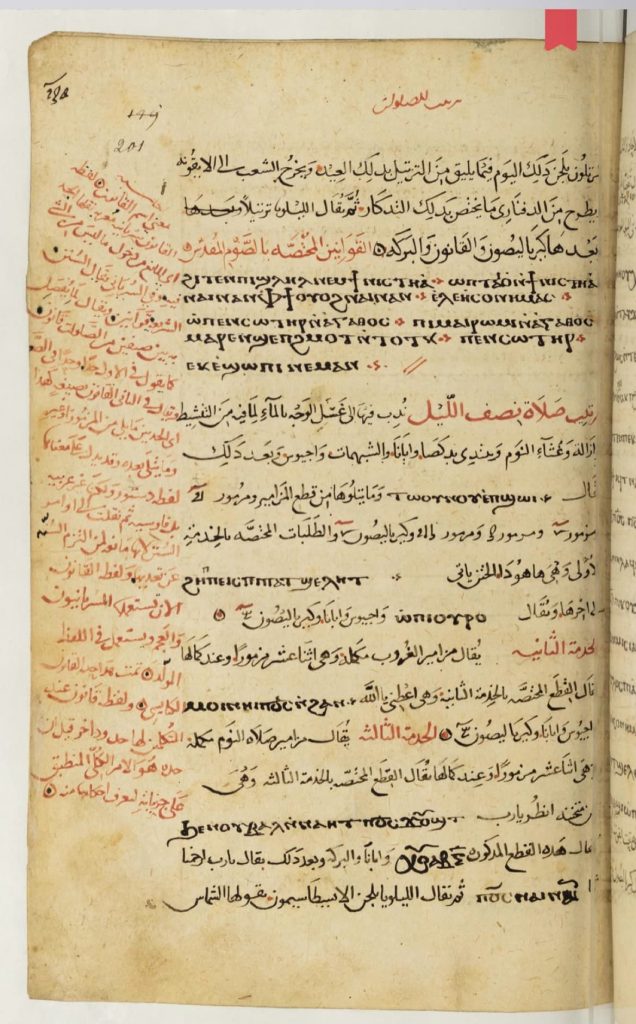
13–17) CP.50 Simaika 716 (1350 AD) Ordo of Palm Sunday, Holy Saturday, and Paschal Sunday, respectively
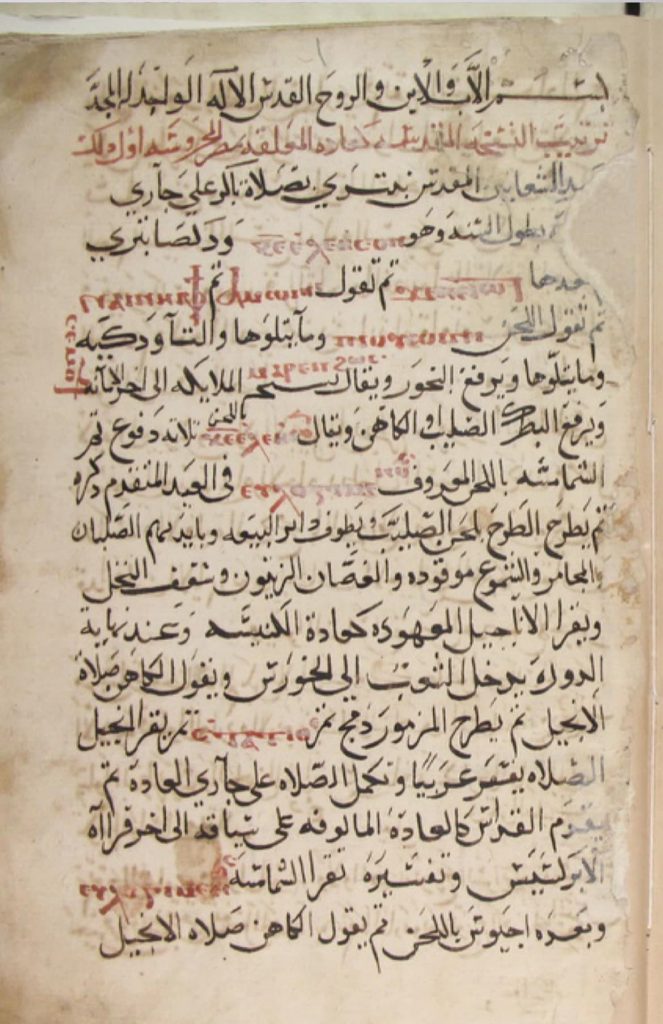
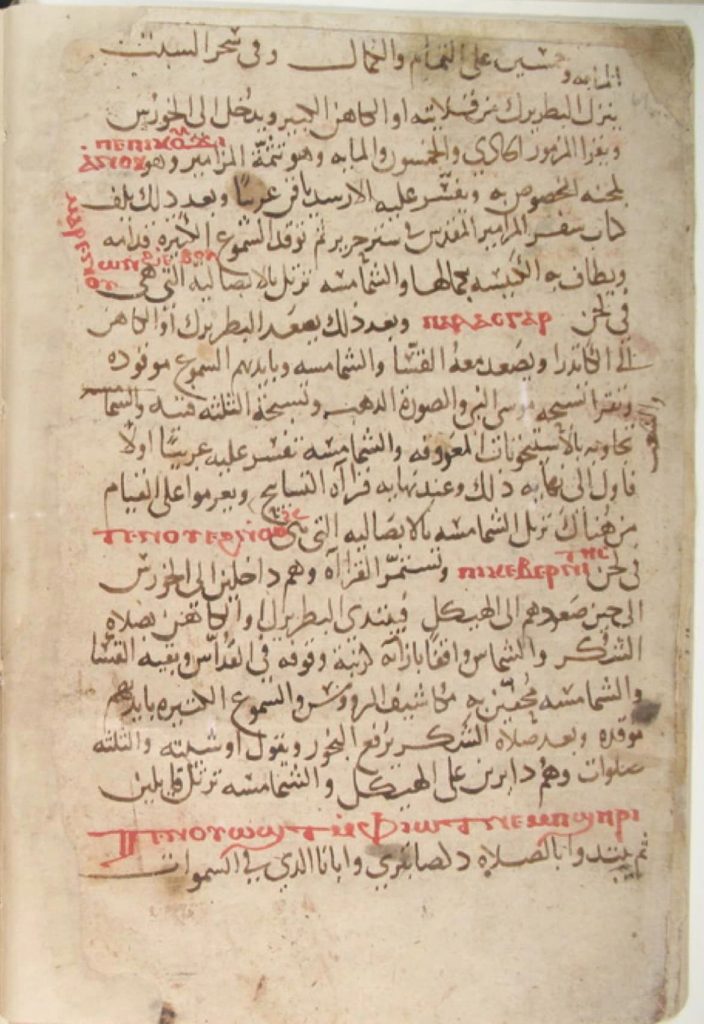
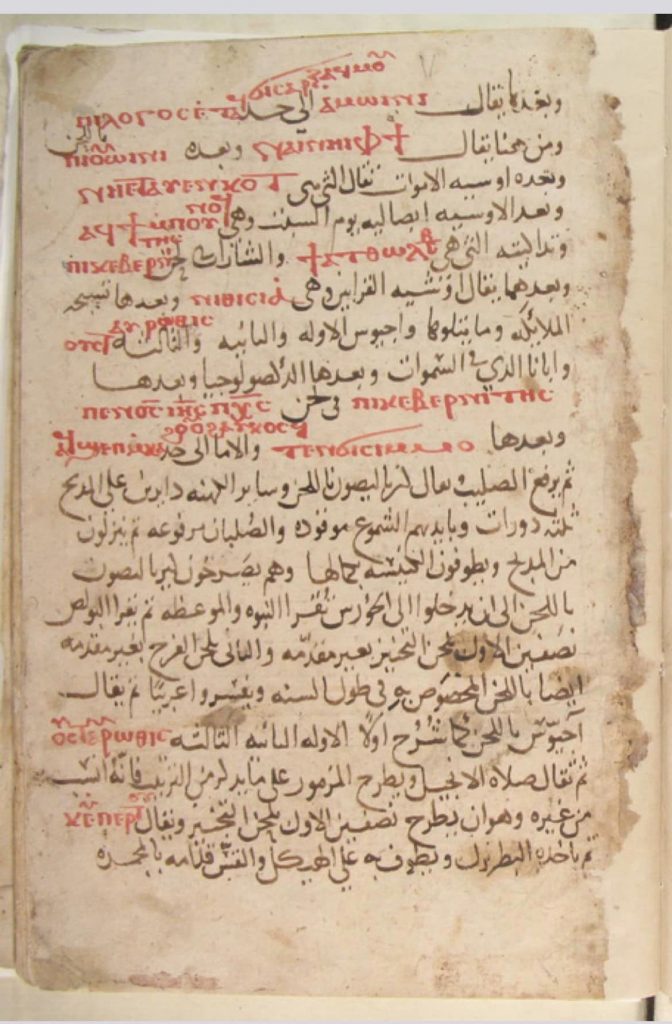
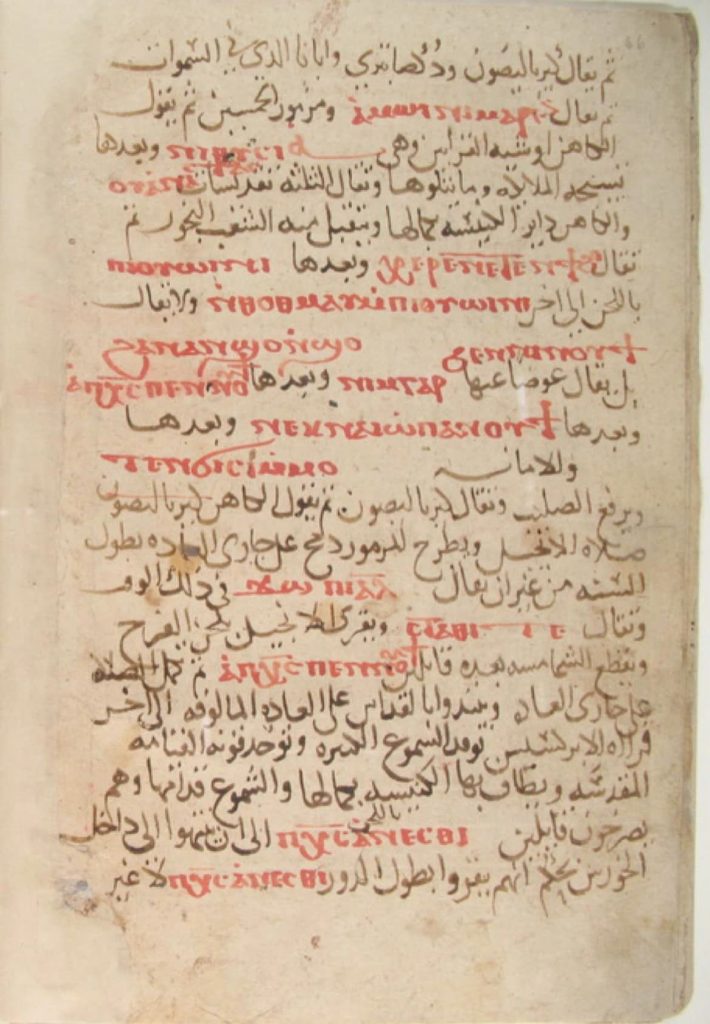
18) Snapshot from O.H.E Burmester’s work, The Canonical Hours of the Coptic Church; notice, ⲁⲙⲱⲓⲛⲓ comes before Ps. L (50)
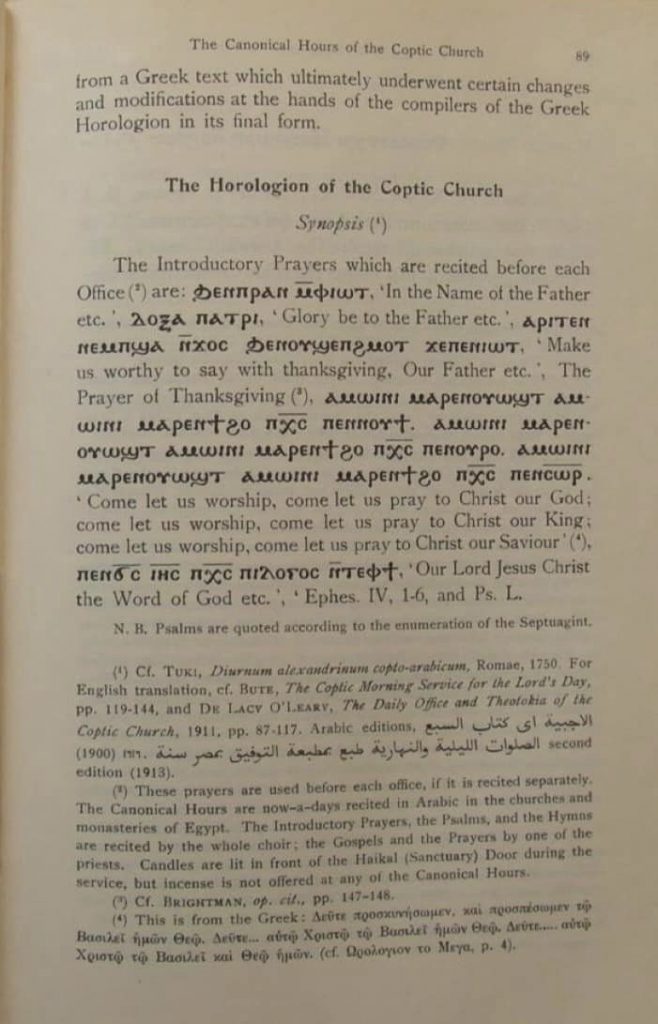
19) Screenshot from the Bright Saturday Rites Book published by St. Mark’s COC, JC, NJ (April 2016)

20–22) Vat.Copto.40 ⲁϫⲡⲓⲁ; notice the order of the two prayers.



23–25) Vat.Barb.Orientale 17 ⲁϫⲡⲓⲁ; notice the order.



26–27) Holy Week Ordo of Abu Serga, Matins of Holy Saturday and Paschal Sunday, respectively



28) Coptic Reader Index for Holy Saturday Matins — Notice they switched the order of Psalm 50 and Come, Let us worship. In addition, you’ll see that ⲁⲙⲱⲓⲛⲓ has been split into three pieces (this isn’t entirely their fault as books have been doing that in the past).

29) Just for comparison, a screenshot from the order of vespers from the EO.
